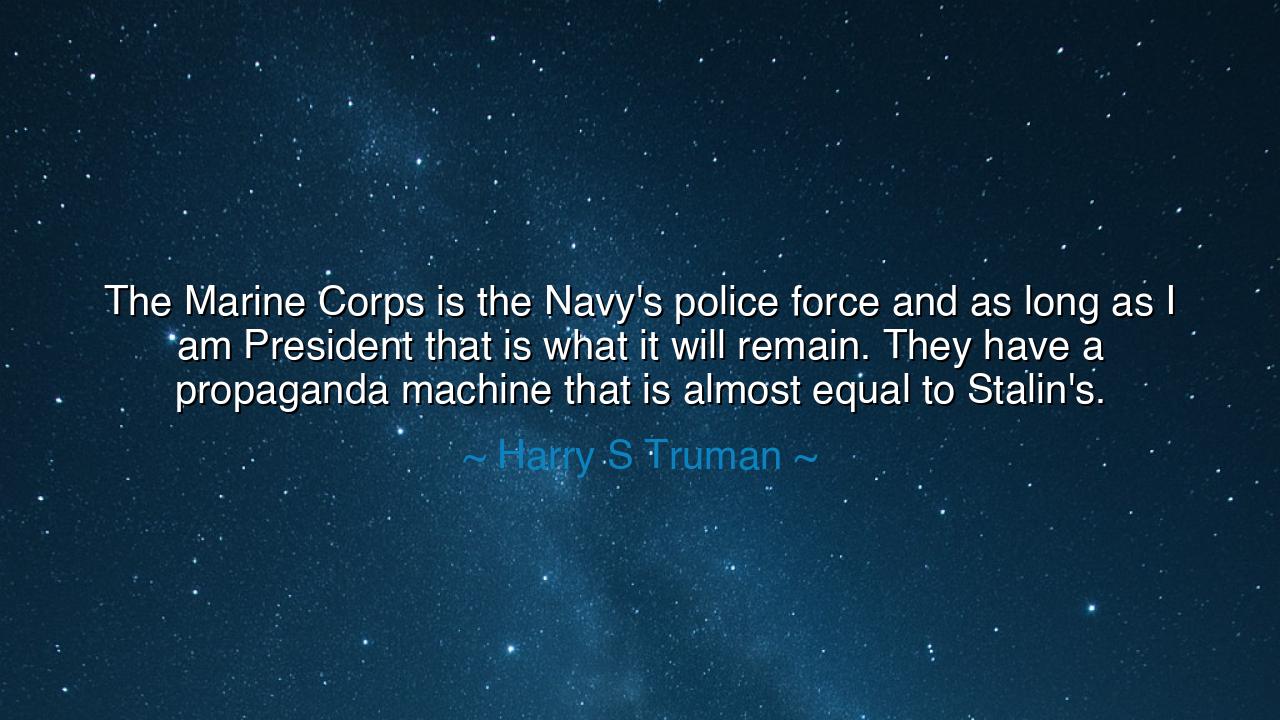
The Marine Corps is the Navy's police force and as long as I am
The Marine Corps is the Navy's police force and as long as I am President that is what it will remain. They have a propaganda machine that is almost equal to Stalin's.






In the sharp and controversial words of Harry S. Truman, we encounter the voice of a leader unafraid to challenge the mighty: “The Marine Corps is the Navy’s police force and as long as I am President that is what it will remain. They have a propaganda machine that is almost equal to Stalin’s.” These words, uttered in frustration and candor, cut through the polished language of politics and expose a moment of fierce debate about power, pride, and purpose within the American military. To understand this quote is to witness a clash not merely between institutions, but between visions of what it means to serve and to lead.
The origin of this statement lies in the early years of the Cold War, in the late 1940s, when President Truman sought to reorganize and streamline the U.S. military following the vast mobilization of World War II. In his attempt to unify the armed forces under a single Department of Defense, he proposed limiting the independence of the U.S. Marine Corps, viewing it as an extension of the U.S. Navy, rather than a separate force of its own. The Marines, fiercely proud of their identity and legacy, resisted these changes with passion and precision. Their leaders, supported by veterans and the American public, launched a vigorous campaign to preserve their status—and it was this campaign, this “propaganda machine,” as Truman called it, that stirred his irritation and his now-famous remark.
To call the Marines merely the Navy’s police force was to diminish their valor in the eyes of many, for they had proved again and again that they were far more than that. From the sands of Iwo Jima to the jungles of Guadalcanal, the Marines had carved their legend into the flesh of history with courage and blood. The image of the flag being raised atop Mount Suribachi was not propaganda—it was a symbol of sacrifice and victory, of young men who had given everything for the promise of peace. To the American people, the Marine Corps was not a subdivision of the Navy—it was a living embodiment of discipline, endurance, and brotherhood.
Yet, Truman’s words, though biting, reveal something more complex than disdain. They reveal a struggle between humility and glory, between the necessity of order and the power of myth. Every institution, when tested by success, must guard itself against pride. The Marines’ legend, burnished by victory and valor, had indeed become powerful—so powerful that it could sway public opinion and shape the course of national policy. Truman feared that this exaltation of one branch above others might cloud the balance of command. He sought to remind the nation that heroism must remain in service to purpose, not pride. In his blunt and earthy way, he warned against allowing fame to harden into arrogance.
The story did not end in bitterness, however. The public outcry that followed Truman’s words was immense, and Congress stood by the Marines. Their independence was preserved, and the President himself, a man of honesty and conviction, later softened his tone, acknowledging their heroism and indispensable role. Time, as it often does, revealed truth on both sides: the Marines were indeed essential, but their greatness—like all greatness—had to remain rooted in humility. Out of that moment of conflict was born a renewed understanding between leader and warrior, between authority and valor.
The deeper meaning of Truman’s remark lies in its warning to all who achieve power or renown. Whether in armies, governments, or the quiet realms of the soul, strength must never forget its purpose. The Marines, for all their might, are servants of the Republic; and the Republic, for all its freedom, must guide strength with wisdom. In this tension lies the heartbeat of democracy—the balance between pride and duty, between freedom and discipline.
So, my children, remember this: when you build something noble—whether a name, a craft, or a nation—guard against the shadow of pride. Let your deeds speak louder than your praise. The Marines, through fire and controversy alike, endured because their foundation was not built upon flattery, but upon faithfulness. Serve with excellence, but never let the glory of your service blind you to the cause you serve. For the moment a man fights for fame, he ceases to fight for freedom.
Thus, from Truman’s fiery words, let us draw this timeless lesson: greatness must be humble, and strength must serve a higher order. Whether you wield a pen, a tool, or a sword, remember—the power that endures is not the power that proclaims itself, but the power that protects, uplifts, and honors the truth for which it stands.






AAdministratorAdministrator
Welcome, honored guests. Please leave a comment, we will respond soon